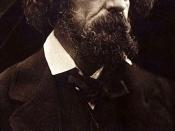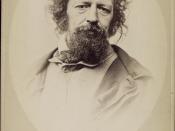During the Victorian Period, long held and comfortable religious
beliefs fell under great scrutiny. An early blow to these beliefs came
from the Utilitarian, followers of Jeremy Bantam, in the form of a test
by reason of many of the long-standing institutions of England,
including the church. When seen through the eyes of reason, religion
became "merely an outmoded superstition" (Ford & Christ 896). If this
were not enough for the faithful to contend with, the torch of doubt was
soon passed to the scientists. Geologists were publishing the results
of their studies which concluded that the Earth was far older than the
biblical accounts would have it (Ford & Christ 897). Astronomers were
extending humanity's knowledge of stellar distances, and Natural
Historians such as Charles Darwin were swiftly building theories of
evolution that defied the Old Testament version of creation (Ford &
Christ 897). God seemed to be dissolving before a panicked England's
very eyes, replaced by the vision of a cold, mechanistic universe that
cared little for our existence.
Alfred, Lord Tennyson was painfully aware of the implications of
such a universe, and he struggled with his own doubts about the
existence of God. We glimpse much of his struggles in the poem In
Memorial A. H. H., written in memory of his deceased friend, Arthur
Hallam. The poem seemed to be cathartic for Tennyson, for through its
writing he not only found an outlet for his grief over Hallam's death,
but also managed to regain the faith which seemed at times to have
abandoned him. Tennyson regained and firmly reestablished his faith
through the formation of the idea that God is reconciled with the
mechanistic universe through a divine plan of evolution, with Hallam as
the potential link to a greater race of humans yet to come.



Informative
I am writing a term paper about Tennyson. This essay is of great help to me.
3 out of 3 people found this comment useful.